The debate at Liz Pike’s Shangri-La Farms was the only chance for the top seven candidates to square off ahead of the Aug. 4 primary election
CAMAS — The seven men vying to become Washington’s first Republican governor in 34 years squared off in their first and only debate ahead of the Aug. 4 primary election Thursday night in Camas.
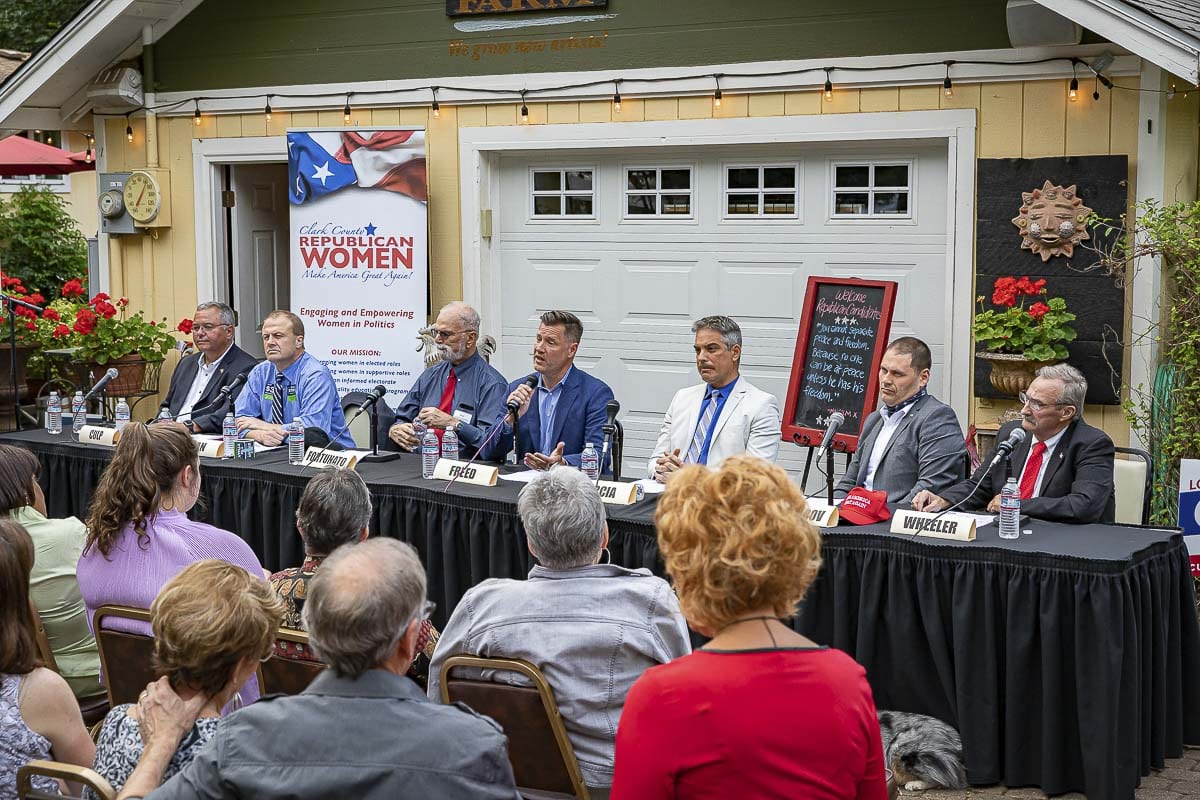
The event was put together by the Clark County Republican Women, and hosted at Shangri-La Farms by former State Rep. Liz Pike.
Around 150 guests were allowed into the event, and more than 600 watched a live stream on the Facebook page of Lacamas Magazine.
After a rousing rendition of the Star Spangled Banner by Vancouver police officer and 49th District candidate Rey Reynolds, the group of gubernatorial hopefuls spent about two hours answering questions on taxes and budget policy, transportation issues, homelessness, the response to the pandemic, and the recent protests and riots following the death of George Floyd in Minneapolis.
The answers were largely variations on the same theme of smaller government, reducing taxes, lifting regulations on small businesses, enforcing the rule of law, and focusing on mental health and addiction treatment to prevent homelessness.
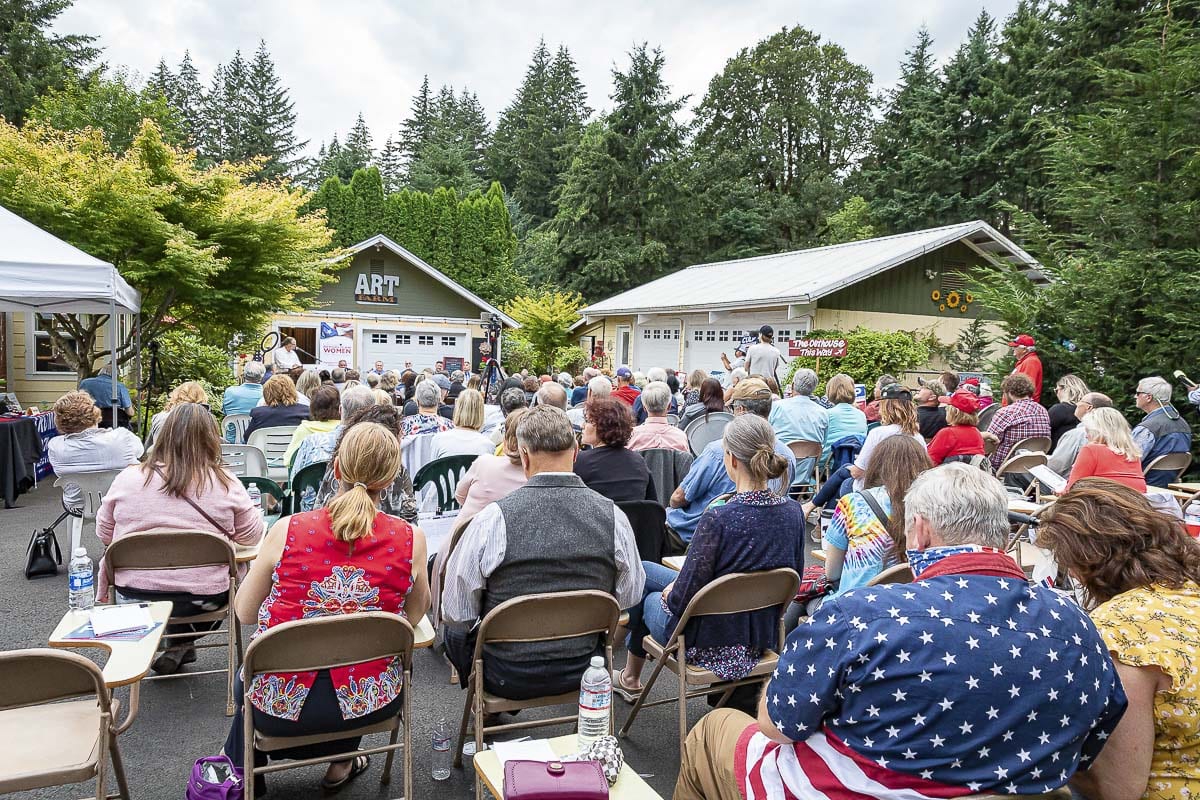
Lacking major policy differences, the seven candidates largely focused on their experience level and ability to challenge the incumbent, Democrat Jay Inslee, who has drawn sharp criticism from conservative circles for his handling of the COVID-19 pandemic, as well as the recent civil unrest in Seattle, which led to a brief occupation in part of that city’s downtown.
If you wish to view the full debate, Clark County Today has put together a fully produced version, which we will be adding here as soon as it is complete.
Below is a brief profile of each candidate, in alphabetical order.
Loren Culp
Culp is currently chief of police in the town of Republic, a community of 1,100 people in northeastern Washington, and has been the front-runner in terms of fundraising, bragging that they raised over $300,000 last month with donations that averaged $70.
A former Army drill sergeant, Culp entered the spotlight in 2018 when he became the first law enforcement executive to say his department would not enforce Initiative 1639, which enacted stricter gun control laws in the state.
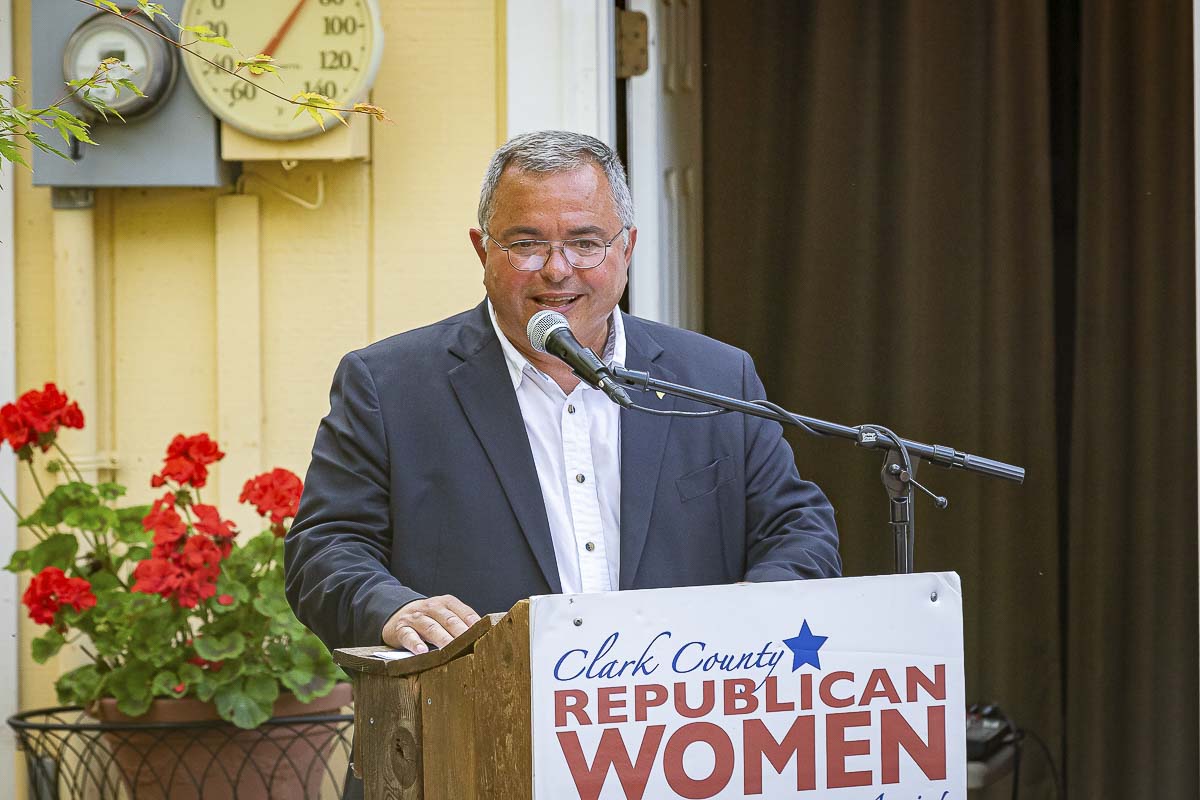
The experience led Culp to write a best-selling book entitled American Cop: Upholding the Constitution and Defending Your Right to Bear Arms, and a series of public speaking engagements around the state.
“I’m running for governor because I was asked to run for governor by the citizens of Washington state,” Culp said, while noting that, in general, he detests politicians. “When the rule of law is followed, and our government stays within the bounds of the constitution, everyone enjoys the same freedom, everyone enjoys the same protection.”
On the state budget, Culp said he would seek a “zero-based” budgeting system, which would require departments to justify their spending ahead of time.
“Right now we have departments that are spending millions and millions of taxpayer dollars that they don’t need to spend,” said Culp. “It’s just left over at the end of the budget cycle, and they want to spend it so that they get an increase in that budget the next year.”
Like the other candidates, Culp said Inslee violated the state constitution when he ordered businesses shut down and people to stay home during the pandemic.
“I would have press conferences with the medical professionals to explain to the citizens of Washington state what they should do to protect themselves,” Culp said, “what might happen to them if they don’t and, as governor, make sure the supply chain is as open as needed.”
On the violent protests that led to the autonomous zone in Seattle’s Capitol Hill district known as the CHAZ/CHOP, Culp said he felt the protests over the death of George Floyd at the hands of Minneapolis police were warranted, but that law enforcement needed to step in when things became violent.
“They were terrorizing that neighborhood. There’s businesses, and there’s people that live there,” Culp said. “We do not negotiate with foreign terrorists, and we should never negotiate with domestic terrorists either.”
A former narcotics detective, Culp laid much of the blame for the state’s current epidemic of homelessness on a system that allows drug and alcohol addiction to continue unabated.
“They need tough love,” he said. “They need a boot in the butt, they need to go to jail. And when they get in jail they get a choice of treatment or prison, or jail, depending on the severity of the crime. Most of them pick treatment.”
On transportation, Culp agreed with the other candidates that Washingtonians prefer to drive, and that state law requires that the Department of Transportation meet the needs of the citizens. While he said the Interstate Bridge project needs to move ahead, Culp added that he would like to pursue the idea of a third river crossing in the future for the area.
“We need more lanes,” he said. “We need citizens, and goods and services, to be able to get across the river, so we need new lanes.”
Culp has had to defend himself in a recent lawsuit, alleging that he and two other officers failed to properly investigate a sexual abuse allegation from 2013. In a statement, Culp said he was just providing backup for the primary officer on the case, and was not involved in the decision about whether or not to bring charges.
To read more about Culp’s campaign, visit his campaign website.
Tim Eyman
Perhaps the most recognizable name on the list belongs to Eyman, who has spent 22 years being a thorn in the side of Democrats, and a few Republicans.
Eyman has made a name for himself as a frequent backer of anti-tax initiatives, most recently with I-976, the $30 car tabs measure approved by 53 percent of voters in 2019, but since tangled up in a series of legal challenges brought by the state.
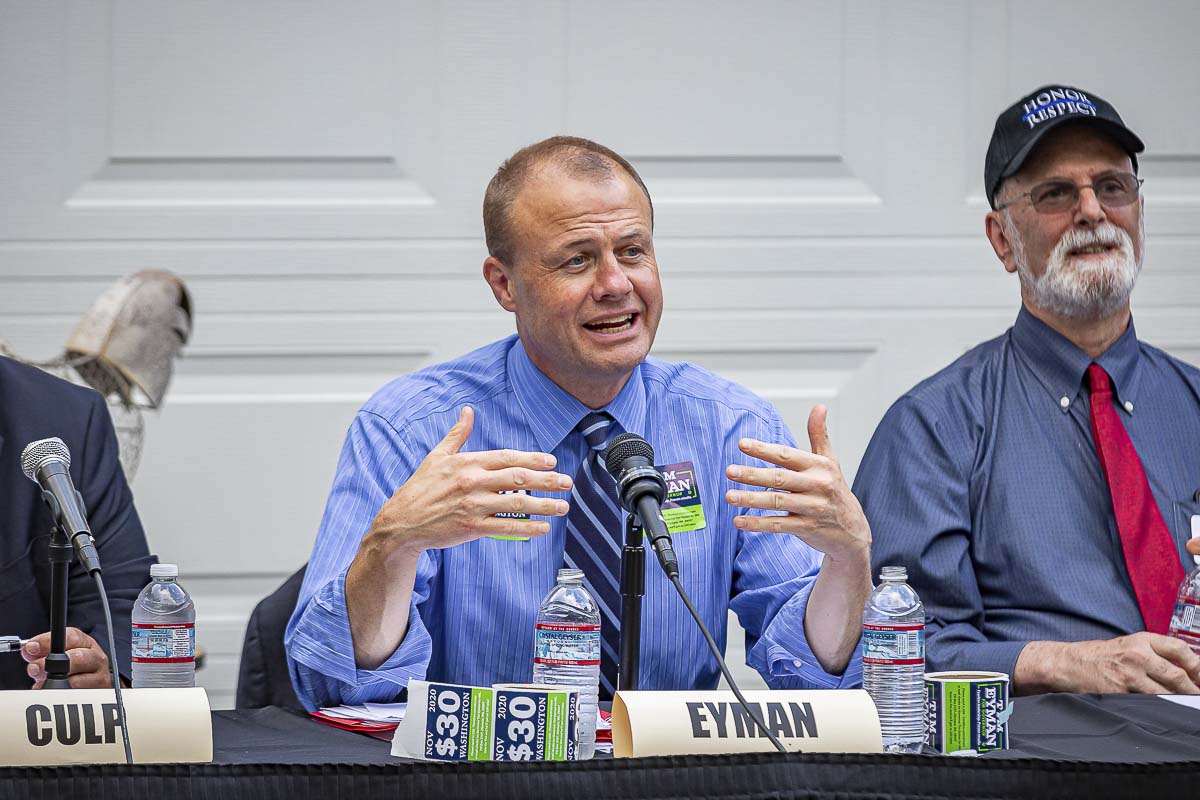
“I looked around when I was deciding whether or not to run,” Eyman said on Thursday, “and I saw the other candidates running, and I said, ‘I just don’t think they’re going to get the job done.’”
Eyman, who made it a point to mention that his middle name is Donald, like the president, said he is the candidate who’s not worried about “getting dirty” when it comes to taking on Inslee.
“I am absolutely committed to getting in Inslee’s face,” he said. “It’s going to be ugly, it’s going to be dirty, and it’s going to be in your face every day.”
Eyman has built a reputation as someone who knows how to get noticed. In 2005, he walked into the office of the Secretary of State wearing a gorilla suit to drop off boxes of signatures. A year later, he attended a news conference dressed as Darth Vader.
“A couple of days ago I was taking on Kshama Sawant, the avowed socialist down on the city council,” Eyman told a cheering crowd on Wednesday, “and I said ‘you ought to be in jail, not behind that microphone.”
On budgetary issues, Eyman said his first goal if elected would be to “unwind four years of Jay Inslee,” and stop the potential implementation of a capital gains tax favored by Inslee, which many conservatives see as a gateway to a statewide income tax.
“They say it’s just going after the rich? Absolutely not,” said Eyman. “We all know how it works. Jay Inslee absolutely committed to an income tax if he gets four more years.”
On the issue of homelessness, Eyman again went after Inslee, saying the problem has been exacerbated by the shutdowns implemented during the pandemic.
“I am absolutely committed to implementing a very real plan that works in Marysville, which says social workers and law enforcement takes on each homeless person one at a time,” said Eyman, “and says ‘you accept service, or you go to jail, or you move along.’”
On transportation issues, Eyman noted his work to push for an advisory vote during the Columbia River Crossing project, which revealed how unpopular the idea of bringing light rail into Clark County was.
“I was so proud of the Southwest Washington legislators that, when they saw the people vote, it gave them a spinal implant and made them fight back and fight for us,” said Eyman. “Inslee doesn’t care about Southwest Washington. He doesn’t care about Yakima, my home town … he cares about Seattle.”
Eyman has faced his share of legal troubles over the years, including a $42,000 settlement in 2002 over allegations he had illegally siphoned money from a campaign, though Eyman has maintained his innocence and did not admit wrongdoing as part of the settlement.
Still, he says the passage of I-976 and his run for governor have left him feeling revitalized.
“I didn’t realize that, really, I was training for 22 years for this moment,” he told the crowd in Camas, “to run against Jay Inslee.”
On Friday, Eyman announced that he’d gained two more endorsements following the event: Liz Pike, and radio personality Scott Hogg who moderated the debate.
“They said it wasn’t even close,” Eyman said in a news release.
To read more about Eyman, visit his campaign page.
Phil Fortunato
The first-term senator from Auburn, Washington represents the state’s 31st District, which includes parts of King and Pierce counties. Fortunato was elected to the Senate in 2017, after having previously served in the House.
The outspoken conservative has been a staunch defender of gun rights, and once ripped up a pocket constitution to make a point on the senate floor.
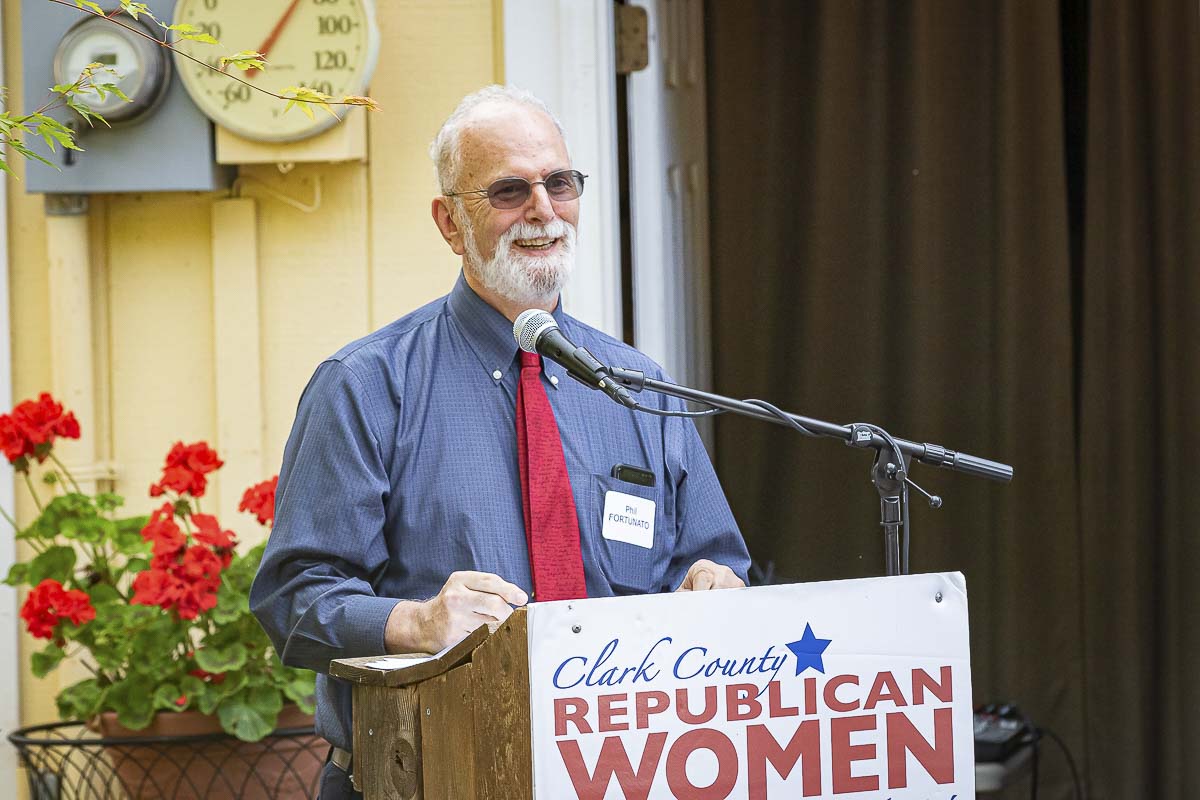
On Thursday, the 65-year-old joked that being the only elected official in the race on the Republican side was both his biggest asset, and his greatest liability.
“I don’t like RINOs (Republicans In Name Only) either,” Fortunato said. “I don’t like somebody that gets elected, says one thing and does another. You don’t have to ask that about me.”
On the budget, Fortunato joked that the only things Inslee hadn’t ruined in the economy with his COVID-19 shutdown was “booze and marijuana.”
“This is a sales-tax-driven state,” he added. “If you want more money, sell more stuff. And you can’t sell more stuff when you’re closed and you’re not operating.”
The senator said he questioned the governor several times about his response to the pandemic, specifically about his decisions when it came to determining which businesses were essential and which weren’t.
“If you can work at a nonprofit multi-family project, why can’t you do single family?” Fortunato wondered. “If you could go to Costco, and Fred Meyer, and WalMart, why can’t you go to Sally Jane’s baby clothes store?”
In economic terms, Fortunato said he believes Inslee’s ultimate goal in closing businesses is to “drive the economy into the crapper, make Trump look bad, and push for an income tax.”
With the state facing a projected $9 billion budget shortfall due to the economic crisis caused by COVID-19, Fortunato said he would start by reducing state department workforces by at least 20 percent.
“Somebody said to me they didn’t want to cut education spending,” he told the crowd. “I said to them, ‘are you saying you want education spending to be 50 percent of the budget? Because, if that’s what you’re saying, we’re talking about a $4 billion budget cut to education.”
Fortunato said he would also move beyond freezing a planned 3 percent raise for state employees, and actually cut pay by at least five percent.
Money also played a part in the senator’s thinking on a new Interstate Bridge, or the idea of a third Columbia River crossing.
“If you want a third bridge, that’s a local issue and your state senators or representatives should be pushing that,” Fortunato said. “I have never heard (Sen. Annette) Cleveland (D-Vancouver) mention anything about a third bridge.”
Fortunato said his proposal was to pay for the new bridge by doubling the tax on marijuana sales, because, “if you’re going to hell in a handbasket, you may as well get there on nicely paved roads.”
In regards to the homelessness situation, Fortunato again blamed the current administration for being lax on crime.
“Have you ever heard them say ‘this guy’s been arrested 23 times?’” he prompted the crowd. “Why is that? The answer to that question is, the prosecutors are not prosecuting them.”
Fortunato said he would give people who are homeless the option of a place to stay in exchange for entering a treatment program if they’re dealing with addiction. If they refuse, they would “have to go.”
Fortunato, who is married with five children, works professionally running a company called Eco-3, which specializes in consulting with businesses on handling stormwater drainage. You can read more about his campaign by clicking here.
Joshua Freed
Freed, a real estate developer who formerly served as mayor of Bothell, may be best known for his lawsuit over the governor’s ban on religious gatherings.
In the suit, Freed said Inslee’s order violated his right to freedom of religion, by preventing him from holding bible studies in his home.

“If a Washington citizen can visit a marijuana shop or grocery store to buy goods in a responsible and socially distanced manner, how are they not allowed to practice faith-based activities and have spiritual fellowship using the same precautions?” Freed said in a news release announcing the lawsuit.
“We went to court and we won,” Freed said on Thursday. “I beat Jay Inslee once, and I can beat him again.”
Talking about Inslee’s response to the crisis, Freed had one of the better lines of the night when he noted that much of the private development he’s involved in was halted, while publicly funded construction projects were allowed to continue.
“Somehow the virus knows the funding source,” he quipped.
In 2017, Freed led an initiative petition process in King County to ban the use of heroin-injection sites. I-27 was adopted by 20 jurisdictions in the Puget Sound area, according to a release announcing Freed’s candidacy.
In speaking about homelessness, Freed noted his background as a mental health counselor before moving into real estate, and said 30 percent of people living on the streets are currently suffering from a mental health crisis.
“But the number one contributor to homelessness is drug and alcohol addiction,” he continued, “80 percent of the homeless are dealing with a drug or alcohol addiction.”
Freed said he would launch a public/private partnership at Evergreen State College to bring in mental health and addiction treatment specialists to help people get clean though a one-year program, or face going to jail.
“That’s our plan, and that’s true compassion,” he said. “That’s loving your neighbor.”
On the topic of the Interstate Bridge, Freed said it’s his opinion replacing the aging lift span should be a priority, but that it should include more travel lanes over mass transit options.
“I’m certainly not against a third bridge,” he added, noting that Congresswoman Jaime Herrera Beutler has been working to secure federal funding for the existing project. “So let’s do what we can to elect her and support the efforts that she is doing on our behalf.”
Freed, who noted he’s been married for 23 years and has five children, including twin 14-year-old boys, said one of his top legislative priorities would be addressing concerns over rising crime.
“Under Jay Inslee, murder has increased by 45 percent and rape has increased by 65 percent,” he claimed. “We live in an absolute state of lawlessness today, which is more dangerous than socialism or communism.”
Freed also said he would work to reduce the “57,000 pages” of regulations facing small businesses, to allow them more room to thrive.
“Making sure that we the people are not existing to grow government,” he said, “but making sure government is existing to serve ‘we the people.’”
Freed also promised that, if elected as governor, he would not take a salary, “because it’s important to me that the people know that we need a servant leader, not somebody who enriches themselves off of special connections or initiatives throughout Washington state.”
To read more about Freed’s campaign, click here.
Raul Garcia
Dr. Raul Garcia is a Cuban immigrant who studied medicine at New York College of Osteopathic Medicine, and has been a practicing physician for 21 years, 13 of those in Yakima. He and his wife, Jessica, a registered nurse, opened a clinic in 2018.
“I’m the Latin guy who’s running in a pandemic,” he joked during his opening statement. “No hugging, no kissing, no shaking hands.”
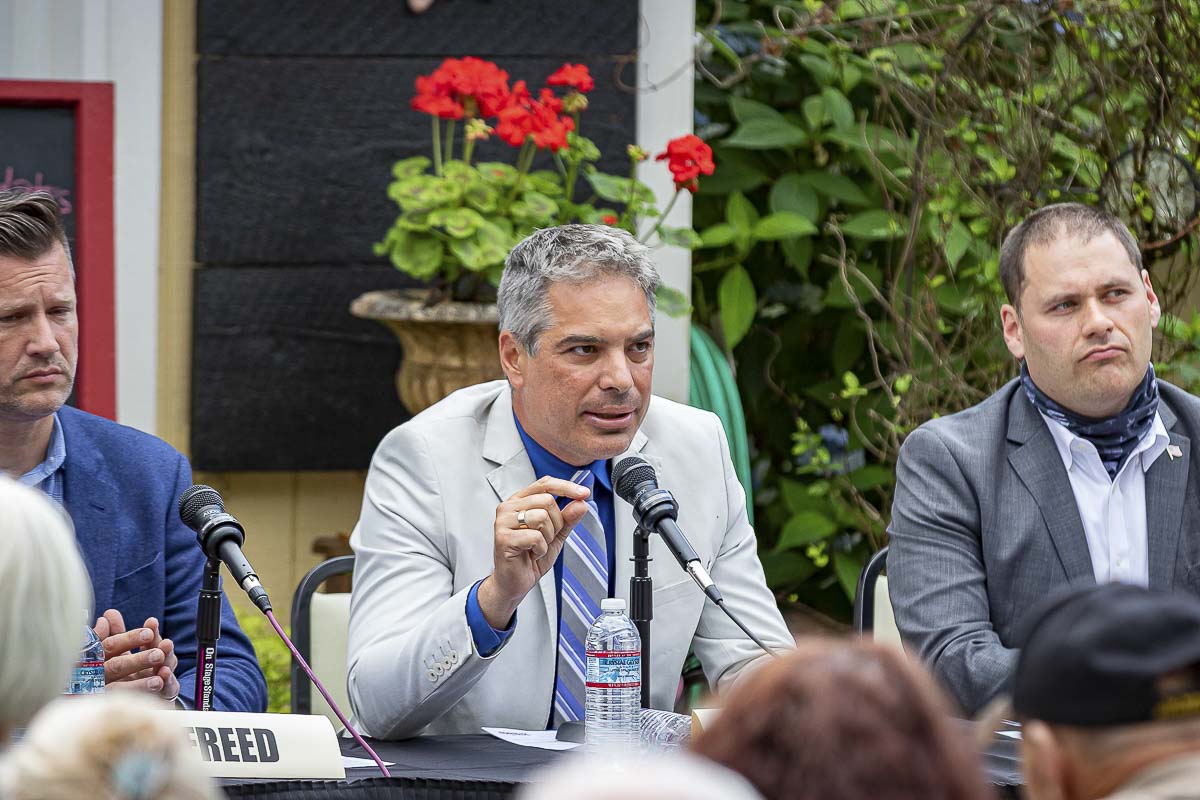
As a practicing physician, Garcia says he’s been on the frontlines of the pandemic in one of the hardest hit counties in the state. While he saw a lot of things he didn’t like, he says the “need to control the people by the government,” is what has stuck with him most clearly.
“I came from Cuba,” he recalled. “When I was in fourth grade, they asked us to put our heads down and ask God for candy and, when we brought our heads back up, candy wasn’t there. So they said, ‘OK, now ask Fidel Castro for candy.’ And candy appeared on every desk.”
After immigrating to America, Garcia says that lesson stuck with him, and left a bad taste in his mouth.
“That same disgusting feeling I had then I have now,” he said, “and I will fight with every ounce of me to make sure that never happens in this country.”
Garcia has not previously held elected office, but says he interned for the late Sen. Bob Dole, which led to his interest in politics.
Garcia said one of the most important questions to him is to answer why the state’s budget has nearly doubled in the past several years, and what the people of the state are getting from that extra money.
“Where is the cancer?” he asked. “Where is it that we need to pay close attention to?”
Garcia said he would follow the advice of Sen. John Braun of Centralia, and use the state’s rainy day fund to help fill much of the expected budget shortfall due to the pandemic.
“We do have a crisis, and we could bring the budget down to a minimal cut,” he said, “but we have to be responsible and understand it so that we can make the right decisions.”
Garcia again referred to his medical background when talking about the issue of homelessness, saying “the cause of the disease needs to be dealt with.”
Echoing the other candidates, he said drug and alcohol addiction and mental health problems are the disease leading to homelessness, and proposed a massive program to bring people into treatment and then into job training.
“So that their hypothalamus is changed and they don’t want to go back out on the street,” he said.
With the issue of a new Interstate Bridge, the doctor’s medical terminology again came into play.
“We need new communications with new arteries and more veins to come in and out so that is not a parking lot,” he said. “Solutions. Then we fund them. Let’s not throw money at things.”
On the response to the pandemic, Garcia said he would have immediately enacted protections for people in long-term care facilities and nursing homes.
“That’s the first thing we should have done,” he said. “People in nursing homes got sick and died.”
Later, after hospitals were forced to begin laying people off because they didn’t have enough business, Garcia says the state should have “released the valve” and let people out responsibly, and “let our economy start up again.”
“That did not happen,” he added. “And now it has become a political football. Let our businesses do their thing so our economy grows again.”
To read more about Garcia’s campaign, click here.
Anton Sakharov
The next candidate in our profile is also an immigrant; a Jewish refugee who arrived in the United States by way of Communist Russia.
Anton Sakharov says his parents brought him to the United States just before he became a teenager to escape the socialist government in Russia, and now he sees the same ideology creeping into Washington politics.
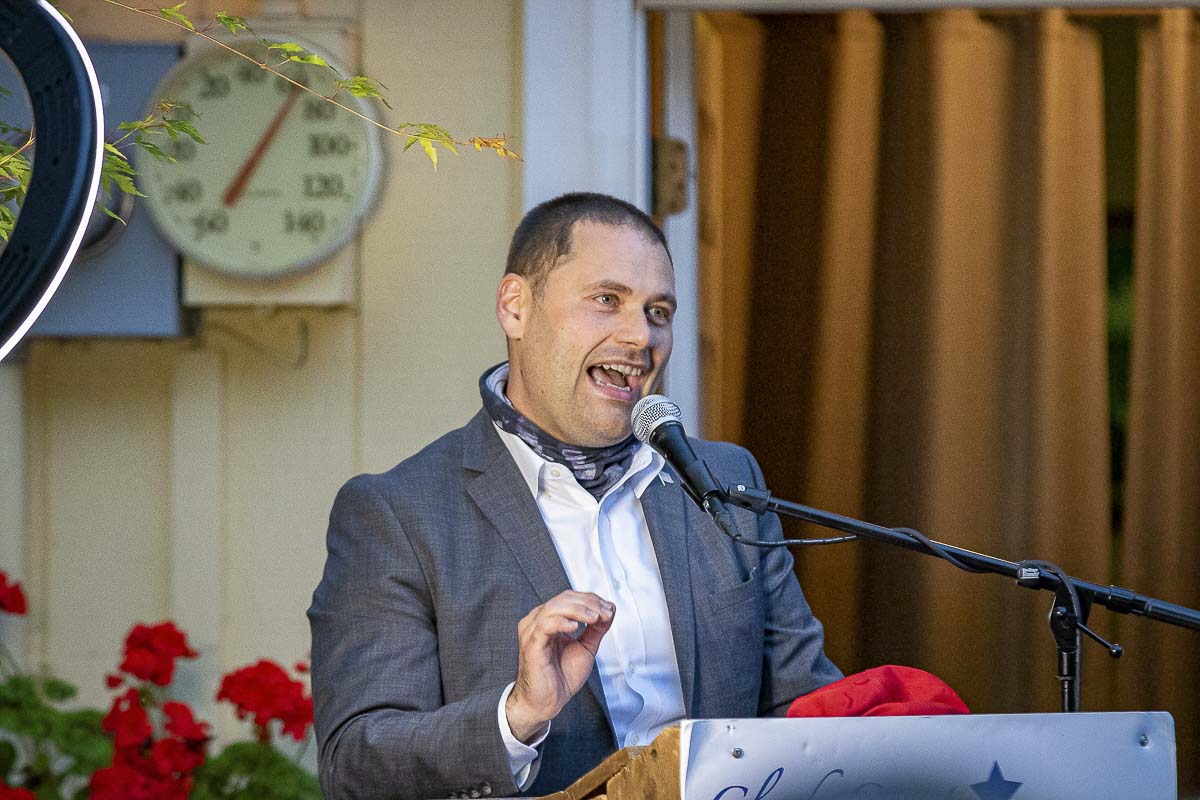
“Socialism is coming,” he said as part of his opening statement. “I have seen it, and I can feel it a mile away.”
Sakharov, who lives in Issaquah, says he wants to be governor to stop the encroachment of socialist views because “I don’t want my own children to have to become immigrants.”
Despite a lack of previous elected experience, Sakharov points to his 13 years of experience in high-tech project management as being useful in running a state.
“I’m actually going to deliver things on time on budget and manage the team,” he said. “I’m not a career politician. Nobody’s writing documents for me, nobody’s training me how to speak well. I’m running because I care.”
On homelessness, Sakharov says he’s “embarrassed” by what is happening in Washington state.
“We have 21,000 people sleeping on the streets while we are home to Amazon, Microsoft and other huge corporations,” he said. “The way we tackle this is we first as citizens need to acknowledge that this is not normal.”
Sakharov says cities, counties, and the state need to come together with a cohesive plan for addressing the situation, including better enforcement of existing laws, and implementing punishments for state agencies that fail to live up to the standard.
“I want to set a very aggressive goal,” he said. “I want to cut homelessness by 90 percent in three years.”
On the I-5 Bridge question, Sakharov said the state needs to move ahead with the current project, or risk owing the Federal government a nearly $140 million repayment, due at the end of 2024.
“From an economic perspective we need to build a bridge,” he said, “but we need to build it in a way that the money is not going to be stolen.”
Sakharov said his first priority if he were elected would be to end Washington’s status as a sanctuary state for illegal immigrants.
“Because, as a legal immigrant, I believe this is hurting our communities,” he said.
Sakharov said he would also work with the legislature to give counties more power to determine their minimum wage, to help places like Clark County better compete with Portland.
Regarding the response to COVID-19, Sakharov said the state should have been better prepared.
“I believe all businesses should have remained open,” he said. “What I would not have done is chosen which businesses survived and which ones didn’t.”
To read more about Sakharov’s campaign, click here.
Martin “Iceman” Wheeler
Perhaps the most colorful of the candidates is Martin Wheeler, a retired firefighter who prefers to go by the nickname “Iceman.”
“A lifelong Washingtonian who was born in Tacoma, Washington State, November 3, 1958, graduated from Bethel Senior High School, Tacoma Community College, and is an alumni’s of the National Fire Academy in Emmetsburg, Maryland,” reads the bio on his campaign website, before concluding, “The rest will remain classified.”
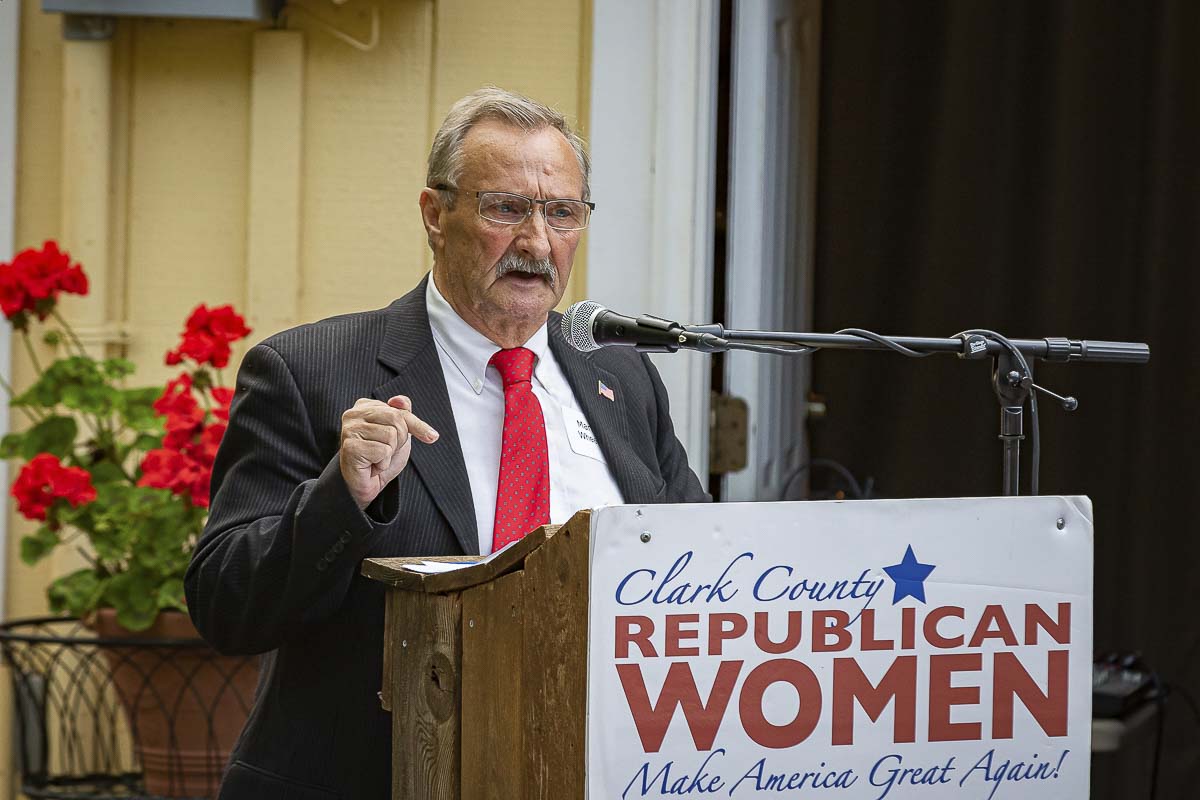
The 61-year-old currently works as CEO of Oak Hills Farms near Snoqualmie, and begins his opening statement with an unusual request of any candidate for the state’s highest office.
“I’m not here asking for a vote,” he says, “I’m here asking you not to give up.”
Wheeler says his first priority would be to have a complete outside audit done of the state government, to figure out where the money is going.
“I guarantee you this,” he says, “when an audit comes in and it is neutral, you find out where the pennies, nickels and dimes are.”
Wheeler also says one of his first acts as governor would be to check the driver’s licenses of every state employee.
“There’s been too much lack of discipline with all of these people,” he says. “I know some things that … the hair on the back of your neck would curl.”
Wheeler also brags that his campaign has been run without taking a single donation from the general public.
“They said it couldn’t be done,” he tells the crowd. “PDC says ‘oh my gosh, your forensics team, it’s proven.’ You don’t need to take money to get in the governor’s race.”
Just maybe to win it.
In a poll of 530 likely voters done by FiveThirtyEight.com last May, every Republican candidate currently faces an uphill battle against Inslee.
Wheeler’s name doesn’t even show up.
Still, as he says “never give up.”
“We are all in this fight together,” he says, “and we must be unified.”
To read more about Wheeler’s campaign, click here.




